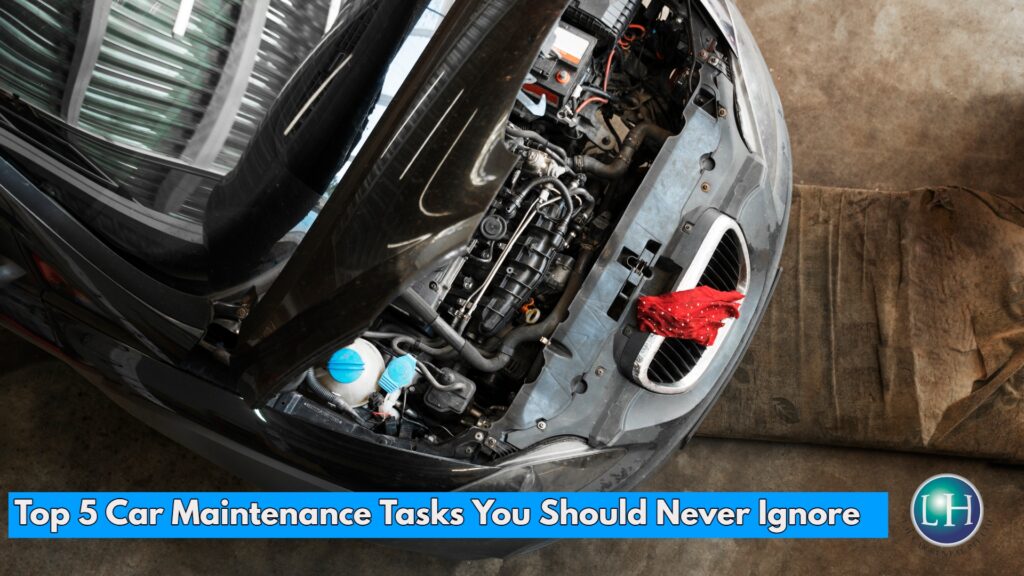
Regular car repair and maintenance is essential for extending the life, performance, and safety of your vehicle. Just as our bodies require regular check-ups to be healthy, cars require continual maintenance to function properly. Ignoring simple maintenance can result in unexpected malfunctions, costly repairs, and even accidents. So let’s take a look at the top five car repair and maintenance tasks that you should never ignore.
1.Checking and Maintaining Fluid Levels
Checking and maintaining fluid levels is one of the simplest yet most important car maintenance tasks. Your car requires a variety of fluids, including engine oil, coolant, brake fluid, gearbox fluid, and power steering fluid to function properly. Each of these fluids are crucial to ensuring that your car runs efficiently:
- Engine Oil: Engine oil lubricates the engine’s moving parts, decreasing friction and preventing wear. Regularly monitoring and replacing your engine oil is critical to keeping your engine operating smoothly and avoiding potential harm. The recommended oil change interval for your vehicle, which is normally every 3,000 to 5,000 miles, is listed in the owner’s manual.
- Coolant: Coolant regulates your engine’s temperature, preventing it from overheating. Check the coolant level on a regular basis and refill it as needed. It is also critical to flush and replenish the coolant according to your manufacturer’s instructions.
- Brake Fluid: Brake fluid is essential for the effective operation of your braking system. Low brake fluid levels can cause reduced braking performance or brake failure. Inspect the brake fluid level on a regular basis and replenish it as needed. If the fluid seems dark or polluted, it is time for a brake fluid replacement.
- Transmission Fluid: Transmission fluid lubricates your transmission’s components and helps to maintain smooth gear shifts. Transmission issues can arise when the transmission fluid is low or filthy. Check the transmission fluid level on a regular basis and replace it according to the manufacturer’s specifications.
- Power Steering Fluid: Power steering fluid allows for simple steering and mobility. Low power steering fluid levels can make steering difficult and may damage the power steering system. Check the fluid level on a regular basis and replace it as needed.
2. Regular Tire Inspections
Your tires are the primary point of contact between your vehicle and the road, therefore keeping them in good condition is critical for safety and performance. Regular tire checks might help you detect problems before they become big issues.
- Tire Pressure: Keeping the proper tire pressure is critical for good handling, fuel efficiency, and tire longevity. Check your tire pressure once a month, especially before long adventures. For the recommended tire pressure, refer to your vehicle’s owner’s manual or the display on the driver’s door.
- Tire Tread: Tire tread gives your tires traction and grip on the road. A worn or uneven tread can affect your vehicle’s handling and increase the risk of hydroplaning.
3. Changing the Engine Oil
Changing the engine oil is one of the most crucial car maintenance procedures you should never ignore. Engine oil lubricates the working elements of your engine, reducing friction and preventing overheating. Over time, engine oil degrades and becomes less effective, resulting in increased engine wear and eventual damage.
- Oil Change Intervals: Refer to your vehicle’s owner’s handbook for the recommended oil change interval, which is usually up to 10,000 km.
- Oil Filter: The oil filter separates dirt, debris, and pollutants from engine oil. To guarantee that clean oil circulates throughout your engine, replace the oil filter with each oil change.
- Oil Type: Follow the manufacturer’s recommendations for oil type and viscosity in your vehicle’s owner’s manual. Using the incorrect oil can degrade engine performance and cause damage.
4. Brake System Maintenance
The braking system is one of the most important safety features of your vehicle. Regular brake system maintenance ensures that your brakes work correctly, delivering dependable stopping power when you require it most.
- Brake Pads: Brake pads wear down over time and must be replaced to maintain proper braking efficiency. If you hear screeching or grinding as you brake, your brake pads may need to be replaced. Have your brake pads tested on a regular basis and replaced as needed.
- Brake Rotors: Brake rotors can distort or wear, reducing braking performance. If you feel vibrations or pulsations during braking, there could be a problem with your brake rotors. Have your rotors inspected, resurfaced, or replaced if needed.
- Brake Fluid: As previously established, brake fluid is required for your braking system to function properly. Check the brake fluid level on a regular basis and add more if needed. If the fluid looks black or polluted, then it’s time for a brake fluid change.
5. Regular Battery Checks
The battery is the heart of your vehicle’s electrical system, providing the power required to start the engine and run different electrical components. Regular battery check-ups will help you avoid unexpected breakdowns and guarantee that your vehicle starts accurately.
- Battery Terminals: Check the battery terminals for evidence of corrosion or loose connections. Clean the terminals if necessary and fasten them securely.
- Battery Voltage: Use a multimeter to measure the battery voltage. A fully charged battery should show 12.6 volts or above. If the voltage is low, it may signal that the battery is weak or failing and should be replaced.
- Battery Age: An average car battery lasts three to five years. If your battery is nearing the end of its life, consider replacing it ahead of time to avoid an unexpected failure.
- Battery Testing: Have your battery tested on a regular basis, particularly before long excursions or during extreme weather conditions. A professional battery test can determine the overall health of your battery and if it needs replacement.
Keep Your Vehicle Running Smoothly with Lian Her Motors
Maintaining your car by following these necessary duties will help you avoid unexpected breakdowns, costly repairs, and accidents. Prioritising these maintenance procedures improves both your driving experience and protects your investment. We, at Lian Her Motors, are dedicated to assisting you in maintaining the best possible condition of your vehicle. We offer all repair and maintenance services including car body repair and car dent repair in Singapore. Schedule your next maintenance appointment with us and enjoy the peace of mind that comes from knowing your vehicle is in capable hands.
